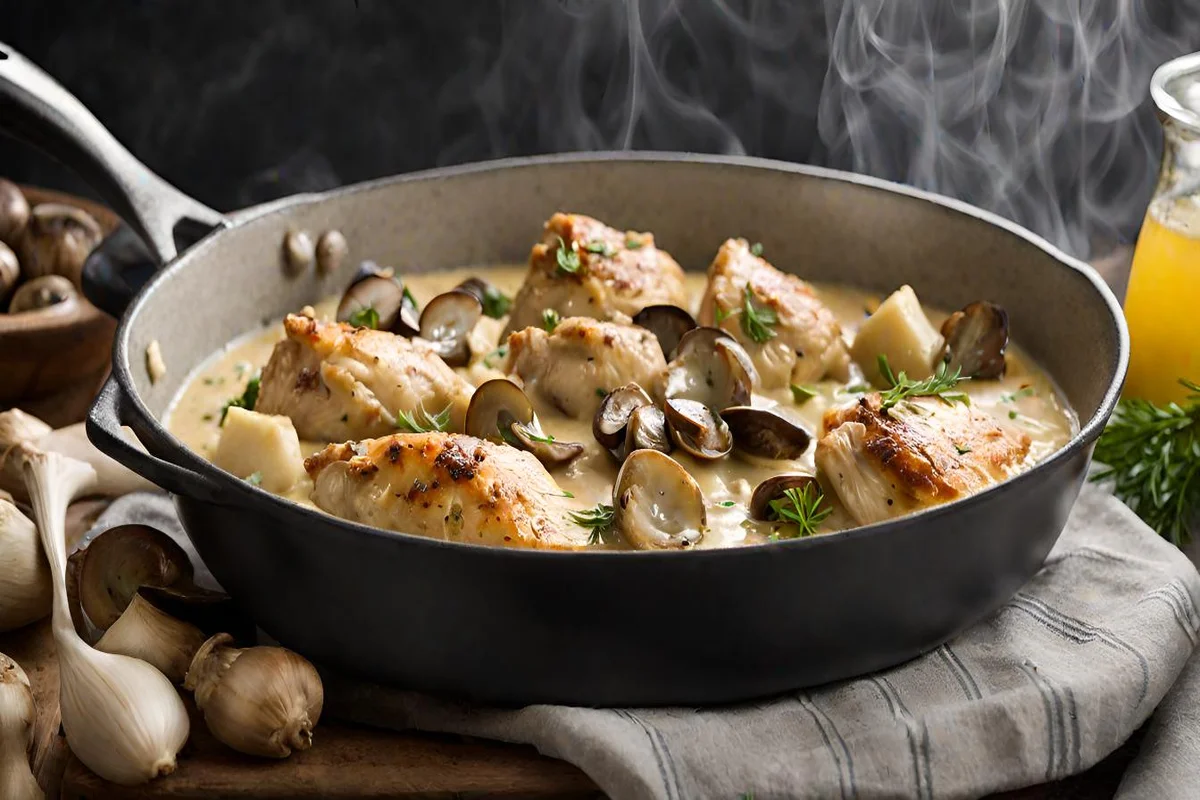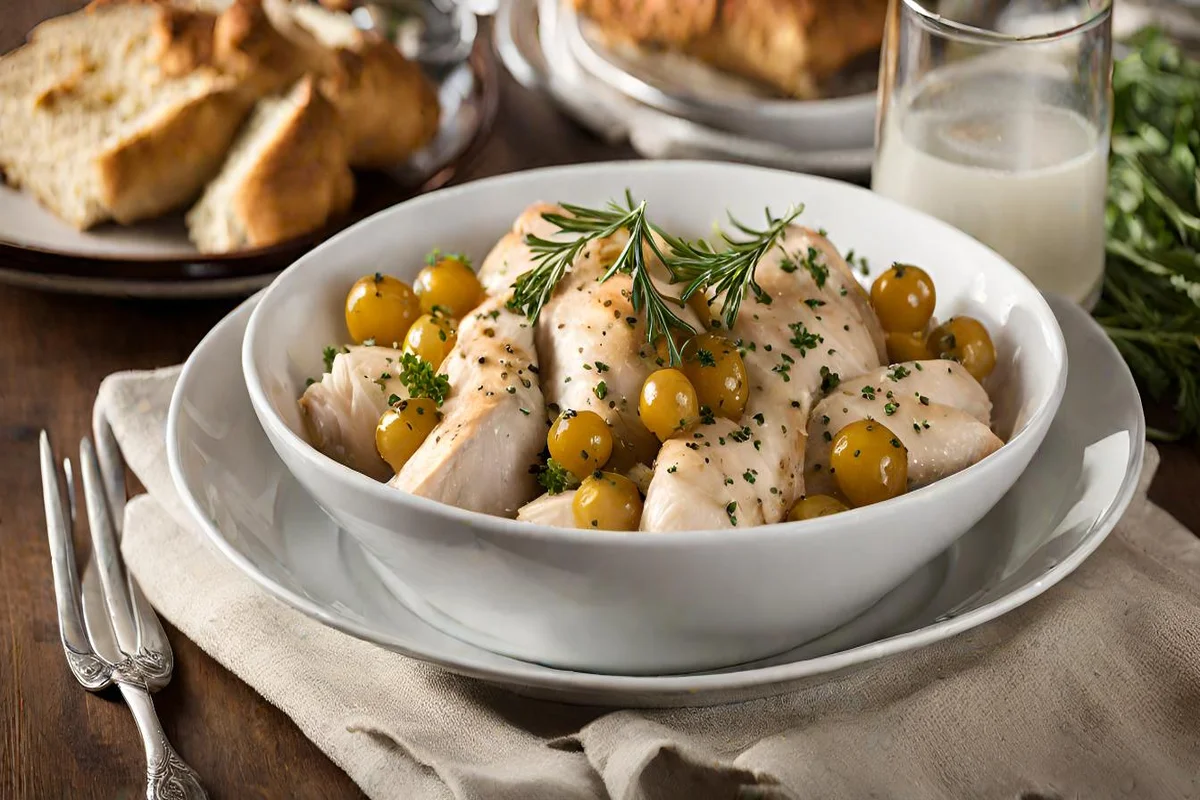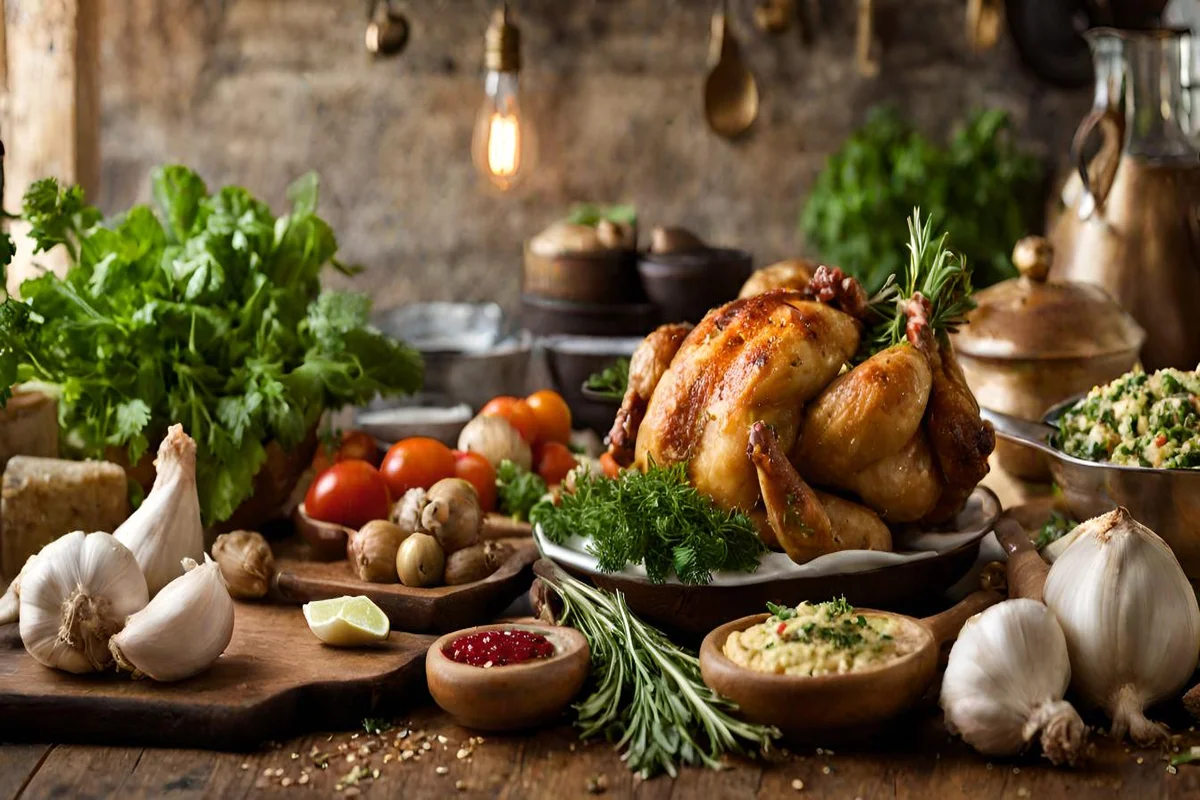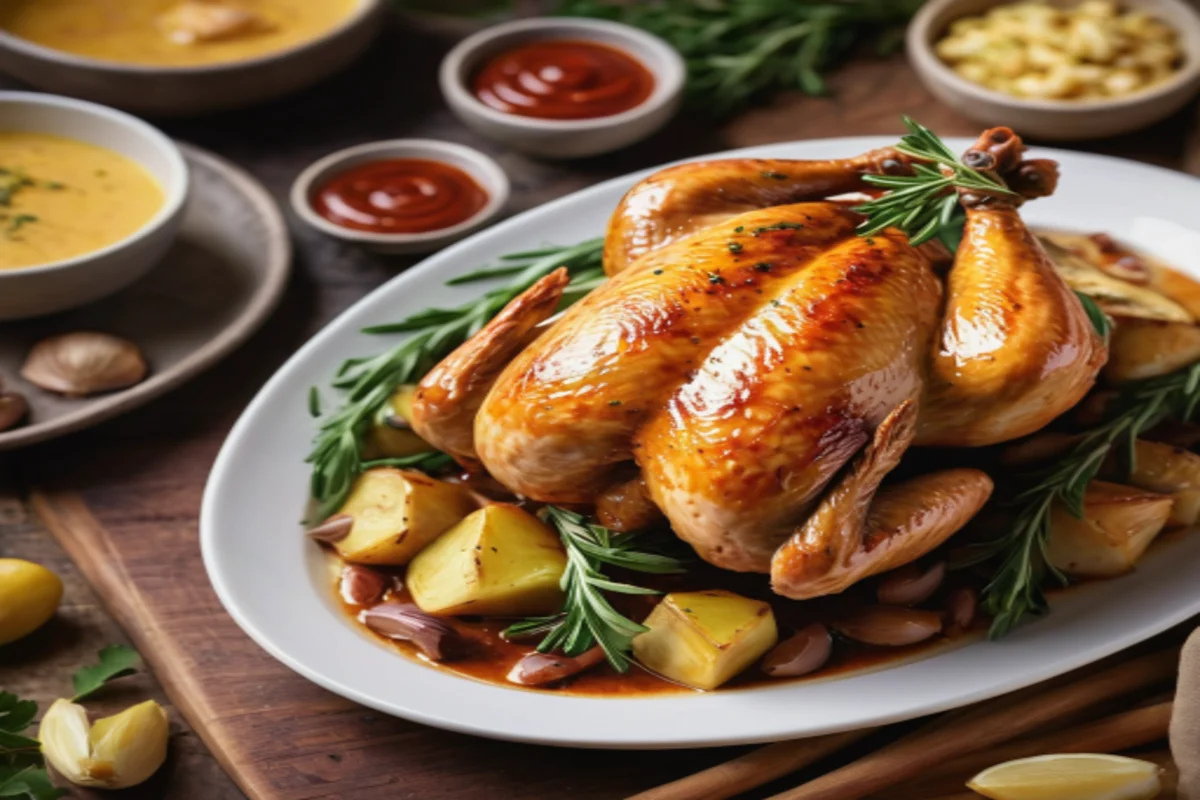In the vast, colorful world of culinary arts, few dishes boast the elegance and rich flavor profile of Chicken Jerusalem. This article dives deep into the heart of this exquisite dish, unraveling its secrets from origins to the perfect serving suggestions. Whether you’re a seasoned chef or a curious foodie, prepare to embark on a flavorful journey that promises to elevate your cooking game and tantalize your taste buds. So, let’s cut to the chase and start with the very essence of Chicken Jerusalem.
What is Chicken Jerusalem? A Culinary Delight Explored
Chicken Jerusalem, often enveloped in mystery, is not just a dish; it’s a celebration of flavors, textures, and culinary history. At its core, this dish combines tender chicken with the earthy tones of artichokes, bathed in a creamy, aromatic sauce. But, oh, it’s so much more than that!
The Origins and Cultural Significance of Chicken Jerusalem
Contrary to popular belief, Chicken Jerusalem doesn’t originate from Jerusalem. Its name, likely a charming misinterpretation of “girasole,” the Italian word for sunflower, mirrors the artichoke’s appearance, a key ingredient in this dish. This culinary gem stands as a testament to the intersection of cultures and ingredients, blending history with flavor in every bite.
At the heart of Chicken Jerusalem lies the artichoke, a vegetable steeped in luxury and ancient history, paired with the universal staple, chicken. This combination creates a dish that is both humble and divine, offering a canvas for culinary creativity. Chefs and home cooks alike can personalize it with their choice of herbs, sauce preparations, and cooking techniques, making it a versatile dish that still comforts and feels like home.
The dish’s global appeal stems from its perfect balance of flavors and textures. The creamy sauce, enriched with artichokes, complements the chicken, creating a rich and nuanced taste symphony. It’s a dish that unites people through the universal language of good food, making it a beloved classic worldwide.
Chicken Jerusalem is more than a meal; it’s a culinary journey and a celebration of cooking. Whether enjoyed in a cozy kitchen or a high-end restaurant, it leaves a lasting impression on both the palate and the heart, embodying a bridge between cultures and a testament to the art of cooking.
The Ingredients That Make Chicken Jerusalem Special
The Key Ingredients of a Classic Chicken Jerusalem
The secret to a sublime Chicken Jerusalem lies in its ingredients. Each component plays a pivotal role, and getting them just right is crucial. So, what goes into this dish to make it sing?
Selecting the Perfect Chicken and Artichokes for Your Dish
First and foremost, the chicken. Opt for boneless, skinless chicken breasts or thighs, depending on your preference for lean or richer meat. The chicken acts as a blank canvas, absorbing the flavors of the sauce and artichokes, so quality is key. Go for organic or free-range chicken if you can—it really does make a difference.
Now, let’s talk artichokes. These thistle-like veggies are the heart (pun intended) of the dish. Fresh artichokes are ideal, but they can be a bit of a hassle to prepare. If you’re short on time or patience, canned or frozen artichokes can be a godsend. Just make sure they’re well-drained and patted dry to avoid a watery sauce.
But wait, there’s more! The sauce, a creamy concoction, typically involves heavy cream, white wine, garlic, and herbs like tarragon or thyme. It’s the glue that binds all the elements together, creating a rich tapestry of taste. And let’s not forget the onions and mushrooms, which add depth and earthiness to the dish.
Here’s a pro tip: to really amp up the flavor, consider adding a splash of lemon juice or zest. It cuts through the richness of the sauce and brightens the whole dish. And for a nutty twist, a sprinkle of grated Parmesan cheese over the top before serving can be a game-changer.
A Table of Ingredients and Their Benefits
| Ingredient | Benefit |
|---|---|
| Chicken | High in protein, versatile in flavor |
| Artichokes | Rich in fiber, antioxidants, and can aid digestion |
| Heavy Cream | Adds richness and a luxurious texture |
| White Wine | Provides acidity and depth of flavor |
| Garlic | Offers health benefits and enhances taste |
| Herbs (Tarragon, Thyme) | Contribute to the dish’s aromatic profile |
| Lemon Juice/Zest | Adds a fresh, bright note |
| Parmesan Cheese | Brings a salty, umami element |
Real-Life Examples from Renowned Chefs
Chefs around the world have put their spin on Chicken Jerusalem. For instance, Chef John from Food Wishes adds a touch of cayenne pepper for a subtle kick. Meanwhile, Ina Garten, the Barefoot Contessa, uses Gruyère cheese for an extra layer of flavor. These tweaks showcase the dish’s adaptability and the importance of personal touch in cooking.
In conclusion, the ingredients of Chicken Jerusalem are more than just a list; they’re a carefully curated ensemble that, when combined, create a dish greater than the sum of its parts. It’s a testament to the beauty of cooking, where simple ingredients can be transformed into something extraordinary.
The Step-by-Step Cooking Process

Mastering the Art of Cooking Chicken Jerusalem
Cooking Chicken Jerusalem is akin to conducting an orchestra; each ingredient must come in at the right time and in harmony with the others. Here’s how to orchestrate this culinary symphony.
Techniques and Tips for a Perfect Chicken Jerusalem Every Time
Crafting the Ultimate Chicken Jerusalem
Chicken Jerusalem, a dish of elegance and comfort, combines succulent chicken with the earthy charm of artichokes in a creamy sauce. Here’s a condensed guide to perfecting this classic dish in your kitchen.
Season and Sear the Chicken
Begin with seasoning chicken breasts or thighs liberally with salt, pepper, and your chosen spices. In a skillet, heat olive oil over medium-high heat and sear the chicken until it’s golden brown on both sides, locking in the flavors and juices. Set the chicken aside to rest, and remember, as with our Baked Thin Chicken Breast recipe, avoid cutting into the chicken right away to ensure it remains juicy.
Artichokes and Aromatics
In the same pan, if needed, add a touch more oil and sauté onions until they’re soft and translucent. Add garlic and mushrooms, cooking until the mushrooms are tender and browned. If using fresh artichokes, prepare them now; if not, add drained artichokes to the pan and sauté briefly.
Deglaze with Wine
Pour white wine into the skillet to deglaze, scraping up the flavorful browned bits. Let the wine reduce by half, allowing the alcohol to evaporate and the flavor to intensify.
Create the Creamy Sauce
Reduce the heat and blend in heavy cream and your choice of herbs. Let the sauce simmer and thicken to your liking, adjusting with chicken broth or more cream if necessary.
Combine and Cook
Return the chicken to the skillet, immersing it in the sauce. Cover and cook until the chicken is done, reaching an internal temperature of 165°F (74°C)—about 15 minutes for breasts and slightly longer for thighs.
Final Touches
Once cooked, stir in lemon juice or zest and adjust the seasoning with salt and pepper. Add Parmesan now, if using, allowing it to melt into the sauce.
A Unique Recipe for Chicken Jerusalem
Here’s a twist on the classic recipe that incorporates a few extra touches for an even more memorable dish:
- Ingredients:
- 4 chicken breasts or thighs
- Salt and pepper to taste
- 2 tbsp olive oil
- 1 onion, finely chopped
- 3 garlic cloves, minced
- 8 oz (225g) mushrooms, sliced
- 1 can (14 oz or 400g) artichoke hearts, drained and quartered
- 1/2 cup (120ml) white wine
- 1 cup (240ml) heavy cream
- 1 tsp fresh tarragon, chopped
- 1 tsp fresh thyme leaves
- Juice and zest of 1 lemon
- 1/4 cup (25g) grated Parmesan cheese
- Fresh herbs for garnish
- Instructions:
- Season the chicken with salt and pepper.
- In a skillet, brown the chicken in olive oil and set aside.
- Sauté onions, garlic, and mushrooms, then add artichokes.
- Deglaze with wine and reduce.
- Stir in cream and herbs, simmering until thickened.
- Return chicken to the pan, cover, and cook through.
- Finish with lemon and Parmesan, adjust seasoning.
- Serve garnished with fresh herbs.
Bullet Points for Tips:
- Searing: Don’t rush the searing process; it builds the foundation of flavor.
- Freshness: Use the freshest ingredients for the best results, especially when it comes to herbs.
- Sauce Consistency: Keep an eye on the sauce; it should coat the back of a spoon when it’s ready.
- Resting: Let the chicken rest for a few minutes after cooking for juicier meat.
Cooking Chicken Jerusalem is a delightful experience that rewards you with a dish that’s both comforting and sophisticated. By following these steps and tips, you’ll ensure that your rendition of this classic is cooked to perfection every time.
Nutritional Profile and Health Benefits
The Nutritional Advantages of Indulging in Chicken Jerusalem
Chicken Jerusalem is not just a feast for the taste buds; it’s also a dish that packs a nutritional punch. Let’s break down the health benefits of this culinary delight.
Balancing Flavor and Health: A Nutritional Breakdown
Chicken: As a lean source of protein, chicken is a great choice for muscle growth and repair. It’s also rich in essential vitamins and minerals, such as B vitamins, which are crucial for brain health and energy levels.
Artichokes: These unique veggies are a powerhouse of nutrients. They’re high in fiber, which aids digestion and keeps you feeling full. Artichokes are also packed with antioxidants, such as cynarin and silymarin, which have been shown to help protect your body from oxidative damage by free radicals (Healthline).
Heavy Cream: While heavy cream is high in fat, it’s also a good source of vitamin A and calcium. Remember, moderation is key!
White Wine: Although the alcohol in the wine cooks off, the remaining compounds can have health benefits. For instance, research indicates that the polyphenols in white wine, like tyrosol and hydroxytyrosol, may contribute to lowering LDL cholesterol levels, often referred to as ‘bad’ cholesterol (American Heart Association).
Garlic: This humble ingredient is a nutritional superstar. It’s known for its immune-boosting properties and potential cardiovascular benefits.
Herbs: Tarragon and thyme, often used in Chicken Jerusalem, are rich in vitamins and have antioxidant and anti-inflammatory properties.
Lemon Juice/Zest: Lemons are high in vitamin C, which is essential for skin health and immune function. They can also aid digestion and freshen breath.
Parmesan Cheese: This cheese is a good source of calcium and protein. Plus, it’s packed with flavor, so a little goes a long way.
A Table of Nutritional Values
| Ingredient | Nutrient |
|---|---|
| Chicken | High in protein, B vitamins |
| Artichokes | Rich in fiber, antioxidants |
| Heavy Cream | Good source of vitamin A, calcium |
| White Wine | Contains polyphenols |
| Garlic | Immune-boosting, cardiovascular benefits |
| Herbs (Tarragon, Thyme) | Rich in vitamins, antioxidants, anti-inflammatory |
| Lemon Juice/Zest | High in vitamin C |
| Parmesan Cheese | Good source of calcium, protein |
How Chicken Jerusalem Fits into a Balanced Diet
Chicken Jerusalem can be part of a balanced diet when consumed in moderation. The chicken provides lean protein, while the artichokes add a dose of fiber and antioxidants. The creamy sauce, though rich, is balanced by the acidity of the wine and lemon. Plus, the herbs and garlic add a boost of flavor without adding extra calories or fat.
Pairing and Serving Suggestions

Complementing Your Chicken Jerusalem: Pairing and Presentation
A well-cooked Chicken Jerusalem is a delight in itself, but the right pairings and presentation can elevate the dining experience to new heights. Let’s explore some creative ways to serve and savor this dish.
Wine and Side Dishes That Elevate Your Chicken Jerusalem Experience
Wine Pairing: The creamy, rich flavors of Chicken Jerusalem pair beautifully with a variety of wines. A crisp, acidic white wine like Sauvignon Blanc or Pinot Grigio can cut through the richness of the dish, while a fuller-bodied Chardonnay can complement the creaminess of the sauce. If you prefer red wine, a light Pinot Noir can work well too.
Side Dishes: When it comes to side dishes, think about balance. A simple green salad with a tangy vinaigrette can provide a refreshing contrast to the creamy chicken, much like the freshness you’d find in our Golden Girl Salad with Sweet Corn Vinaigrette. Steamed vegetables or a medley of roasted root vegetables can also be a great accompaniment. For a heartier meal, serve Chicken Jerusalem over pasta, like the kind featured in our Marry Me Chicken Tortellini recipe, rice, or with a side of crusty bread to soak up the delicious sauce.
Presentation: The presentation of Chicken Jerusalem should be as elegant as its flavors. Serve the dish in a shallow bowl or a deep plate to showcase the creamy sauce. Garnish with fresh herbs for a pop of color and a sprinkle of Parmesan for a final touch of indulgence.
Real-Life Examples from Famous Restaurants
Many renowned restaurants serve Chicken Jerusalem with their unique twists. For instance, The French Laundry, a Michelin three-star restaurant in California, serves their version with a side of truffle-infused mashed potatoes. Meanwhile, Le Bernardin in New York pairs the dish with a glass of French Chardonnay and a side of asparagus risotto.
Common Mistakes and How to Avoid Them
Avoiding Pitfalls: Common Mistakes in Preparing Chicken Jerusalem
Even the most experienced chefs can encounter hiccups when preparing a dish as nuanced as Chicken Jerusalem. Let’s navigate through some common mistakes and learn how to sidestep them.
Troubleshooting Tips for a Flawless Chicken Jerusalem Dish
Overcooking the Chicken: One of the cardinal sins in cooking chicken is overcooking it, which leads to dry, tough meat. To avoid this, use a meat thermometer to check for doneness—165°F (74°C) is the magic number. Also, remember that the chicken will continue to cook slightly once removed from the heat, so it’s okay to take it off the stove a bit early.
Underseasoning: Chicken Jerusalem relies on a delicate balance of flavors, and underseasoning can leave it tasting bland. Be generous with salt and pepper, and don’t forget to taste your sauce throughout the cooking process, adjusting the seasoning as needed.
Choosing the Wrong Cream: Using light cream or milk might seem like a healthier choice, but they can curdle when combined with the acidity of wine and lemon. Stick to heavy cream for a stable and luxurious sauce.
Not Draining Artichokes Properly: If using canned or frozen artichokes, ensure they are thoroughly drained and patted dry. Excess moisture can water down your sauce, diluting the flavor and ruining the texture.
Rushing the Sauce: A good sauce takes time. Allow it to simmer and reduce until it reaches the perfect consistency. If you rush this step, you might end up with a sauce that’s too thin or lacking in depth.
Ignoring the Resting Time: After cooking, give your chicken a few minutes to rest before slicing or serving. This allows the juices to redistribute, ensuring that each bite is moist and flavorful.
Anecdotes or Case Studies
Consider the story of Chef Anna, who once served a Chicken Jerusalem that was less than stellar due to overcooking the chicken. She learned her lesson and now swears by her trusty meat thermometer. Or take the example of a popular bistro that once had to remake an entire batch of Chicken Jerusalem because the sauce curdled—they’ve since switched to using only heavy cream.
Bullet Points for Quick Reference:
- Check Chicken Temperature: Aim for 165°F (74°C) and let it rest.
- Season Well: Salt, pepper, and taste as you go.
- Use Heavy Cream: Avoid curdling with the right cream choice.
- Drain Artichokes: Remove excess moisture for a thicker sauce.
- Simmer Sauce: Patience is key for a rich, flavorful sauce.
- Rest the Chicken: Let it sit for juicier meat.
FAQs About Chicken Jerusalem

Your Questions Answered: Chicken Jerusalem FAQ
Chicken Jerusalem is a dish that often piques curiosity and questions. Here’s a comprehensive FAQ section to address those queries and shed light on this beloved dish.
From Preparation to Preservation: Addressing Common Inquiries
Q: Can I make Chicken Jerusalem ahead of time? A: Absolutely! You can prepare the dish up to the point before you add the final herbs and lemon juice. Let it cool, then store it in the refrigerator. When you’re ready to serve, gently reheat it on the stove, add the fresh herbs and lemon juice, and serve.
Q: What are the best herbs to use in Chicken Jerusalem? A: Tarragon and thyme are classic choices, but feel free to experiment with others like rosemary or basil for a different flavor profile. Fresh herbs are best, but dried can work in a pinch—just use them sparingly as they’re more potent.
Q: How can I thicken the sauce if it’s too runny? A: If your sauce is too thin, you can thicken it by simmering it longer to reduce it. Alternatively, you can make a cornstarch slurry (cornstarch mixed with a little cold water) and whisk it into the sauce, letting it cook for a few more minutes until it reaches the desired consistency.
Q: Is there a dairy-free alternative for the cream in Chicken Jerusalem? A: Yes, for a dairy-free version, you can use coconut cream or a plant-based cream alternative. Keep in mind that this will change the flavor slightly, but it can still be delicious.
Q: Can Chicken Jerusalem be frozen? A: It’s best enjoyed fresh, but if you need to freeze it, do so without the final touches of herbs and lemon juice. Thaw it in the refrigerator overnight and reheat it slowly on the stove, then add the fresh herbs and lemon juice before serving.
Bullet Points for Quick Reference:
- Make-Ahead: Prepare in advance and add fresh herbs and lemon juice when reheating.
- Herb Variations: Tarragon and thyme are traditional, but other herbs can be used.
- Thickening Sauce: Simmer to reduce or use a cornstarch slurry.
- Dairy-Free Options: Use coconut cream or plant-based alternatives.
- Freezing: Freeze without herbs and lemon juice, then add when reheating.
- Reheating: Do so gently on the stove, adding liquid if necessary.
- Special Diets: Adapt for gluten-free or lower-fat preferences.
Conclusion and Call to Action
Embracing the Essence of Chicken Jerusalem
As we bring our culinary exploration to a close, it’s clear that Chicken Jerusalem is more than just a recipe—it’s a narrative of taste, tradition, and the joy of cooking. This dish, with its creamy sauce and tender chicken, is a testament to the beauty of simple ingredients coming together to create something truly magnificent.
Your Next Steps to Enjoying This Exquisite Dish
Now that you’ve been equipped with the knowledge of what makes Chicken Jerusalem so special, the detailed steps to prepare it, the nutritional benefits it offers, and the solutions to common cooking conundrums, it’s your turn to don the chef’s hat and bring this dish to life in your own kitchen.
Remember, cooking is an art, and like any art, it’s meant to be shared. So, we encourage you to invite friends or family over and make Chicken Jerusalem the centerpiece of a memorable meal. Let the conversation flow as freely as the wine, and watch as the dish you’ve prepared with care becomes a catalyst for connection and joy.
A Call to Action for Aspiring Chefs and Food Enthusiasts
We invite you, dear reader, to take the plunge and create your own version of Chicken Jerusalem. Use the tips and tricks you’ve learned here to tailor the dish to your taste. Experiment with different herbs, adjust the thickness of the sauce to your liking, and find the perfect wine to accompany your creation.
And once you’ve mastered Chicken Jerusalem, don’t stop there. Let this dish inspire you to explore other recipes, to learn more about the ingredients you love, and to continue growing as a cook and a connoisseur of fine food.
Share Your Experience
We’d love to hear about your Chicken Jerusalem adventures. Share your stories, photos, and feedback with us. Did you stick to the classic recipe, or did you add a personal twist? What did you learn in the process, and how did your guests react to the dish?
Your experiences enrich the collective knowledge of the cooking community and inspire others to try their hand at this and other culinary delights. So, don’t be shy—spread the word about your Chicken Jerusalem success!
Bullet Points for Quick Reference:
- Try It Yourself: Take the knowledge you’ve gained and apply it in your kitchen.
- Share the Love: Cook for friends and family and enjoy the dish together.
- Get Creative: Personalize the recipe and make it your own.
- Join the Conversation: Share your experiences and inspire others.
In conclusion, Chicken Jerusalem is a dish that embodies elegance, comfort, and the pleasure of good food. It’s a recipe that invites creativity, demands attention to detail, and rewards with deep, satisfying flavors. So, go ahead, give it a try, and savor the elegance that is Chicken Jerusalem.
Thank you for joining us on this gastronomic journey. May your kitchen be filled with the delightful aromas of this classic dish, and may your table be surrounded by the warmth of good company. Bon appétit!
